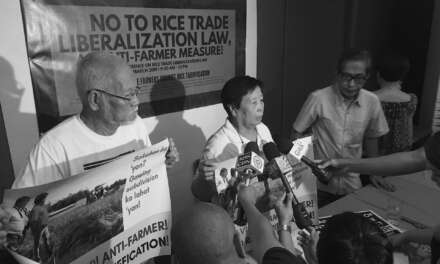As we commemorate today the International Day of Peace, let us all stand in solidarity with various peoples’ movements and learn from the grassroots communities the importance of analyzing the roots of the state of “unpeace” we are experiencing in the time of COVID-19.
This unpeace we are facing is the product of a complex combination of factors in the social, economic, political, cultural, and environmental dimensions. At the same time, it is also important to emphasize that COVID-19 is not the root cause of many of the problems and disruptions afflicting the entire world – it is merely the symptom of a broken and unjust system perpetuated by the twin crises of authoritarianism and neoliberalism.
In the Philippines, with arguably the world’s strictest and longest lockdown in place, various people’s mobilizations have been initiated both online and offline, spontaneously and planned, collectively and issue-specific.
Despite the tyrannical Duterte regime’s heavy-handed and militaristic approach to COVID-19, people from different political and sectoral backgrounds across the country have stood against the government’s incompetence, terrorism, and impunity. They come from different movements and communities – peasants, fisherfolk, indigenous peoples, workers, students, youth, women, LGBTIQ, human rights advocates, cultural artists – united by the struggle for rights, justice, democracy, and peace (that is, one that is not only about eliminating wars and armed conflicts but also involves the struggle for social and environmental justice, equality, and sustainable development).
As Brazilian educator and philosopher Paulo Freire said in his book Pedagogy of the Oppressed: “The dominant elites consider the remedy to be more domination and repression, carried out in the name of freedom, order, and social peace (that is, the peace of the elites).” In these uncertain and difficult times of COVID-19, we are seeing more and more the consolidation of power of authoritarian governments, the neoliberal agenda for COVID-19 capitalism, and the twisted notions of justice – all skewed in favor of the peace of the elites rather than the peace of peoples.
Today, the United Nations invites us to embark on a journey of “Shaping Peace Together” Focus on the Global South adds our voice to the collective outcry of people’s movements across the region and around the world: There can be no peace with oppression. There can be no peace with the domination of the elites and tyranny of warmongers. There can be no peace without freedom, and no freedom without peace.
In the midst of darkness besetting our world, let us draw hope from the reignited grassroots solidarities, and people’s alternatives for a more just, and peaceful world.
#SONAgKAISA
The #SONAgKAISA coalition started on July 17 and gathered individuals and representatives of multi-sectoral groups from different political persuasions. On July 27, the day of Duterte’s 5th State of the Nation Address, thousands of members of over 60 youth organizations flocked to the University of the Philippines Diliman to denounce the Duterte administration’s incompetent COVID-19 pandemic response, the passage of the Anti-Terrorism Law, and the shutdown of ABS-CBN, the Philippines’ biggest media and entertainment network.
This massive protest was live-streamed on various Facebook accounts, and alternative news networks. Prior to the SONAgKAISA, also held a united press conference, SONAgKAISAng Kabataan sa Paglaban! (United Youth Resist!).
Focus on the Global South, in our Post-SONA 2020 Assessment, emphasized the imperative of collective mobilizations: “The united actions under the banner of SONAgKAISA and the various sectoral and thematic actions articulate a counter-narrative focusing on the perspectives of the marginalized and the unheard and offer a different agenda of social transformation that challenges the status quo, questions government policies and priorities, and condemns the actions or inactions of the State.”
37 petitions against Anti-Terrorism Law
The Anti-Terrorism Act of 2020 was signed into law by President Rodrigo Duterte on July 3, repealing the Human Security Act of 2007. In its statement on the passage of the new law, Focus on the Global South stated: “The threat to our human rights, fundamental freedoms, and the principles of democracy which we struggle to advance will not go unchallenged. Even as the people’s lawyers, constitutional experts, and progressive legislators take the lead in challenging the Terror Law before the Supreme Court, social movements, progressive groups, and ordinary Filipinos have come together to declare that we will not be cowed and that we will stand in defiance of this patently unconstitutional and unjust law – a law that is meant to advance the regime’s authoritarian and neoliberal agenda.”
Focus on the Global South joins the broad movement against the Anti-Terrorism Law in street mobilizations, on social media, and other online and offline displays of dissent. Focus also supports the ongoing legal and political challenge to the Anti-Terrorism Law and joins efforts to inform and mobilize a critical mass toward resisting this instrument of state tyranny. As of writing, there have been 37 petitions against the Anti-Terrorism Law filed by various groups at the Supreme Court:
#JusticeForJenniferLaude
On September 11, various organizations led by the Scrap Visiting Forces Agreement (VFA) Coalition protested against the presidential pardon granted to Joseph Scott Pemberton. Pemberton was the US Marine who murdered Jennifer Laude in 2014. Deployed in the Philippines to take part in joint military exercises, Pemberton had met Jennifer at a club in Olongapo City. Thereafter, they checked into a motel, where Pemberton, after finding out that Jennifer was transgender, choked and drowned her.
More than a year later, Pemberton was found guilty of homicide, which was downgraded from the original charge of murder. The court sentenced him to six to 12 years in prison. This was later reduced to a 10-year maximum sentence on appeal. At the time, many human rights groups saw Pemberton’s conviction as a victory, as he was the first US service member to be convicted of a felony by a Philippine court without having that conviction overturned.
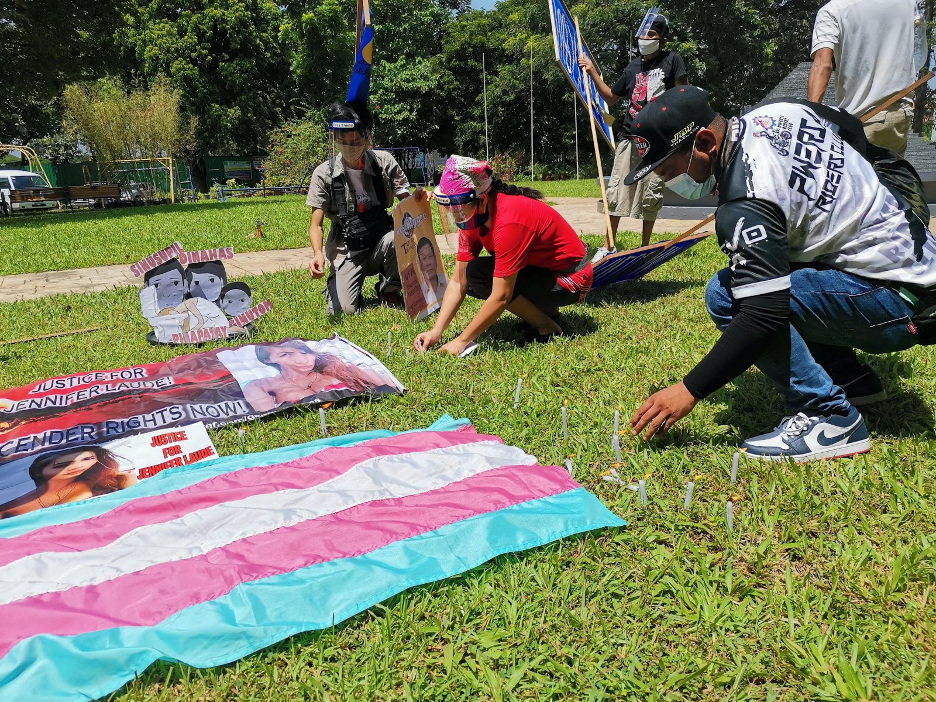
Protesters unfurl a Transgender Pride Flag together with banners demanding justice for Jennifer Laude in Quezon City on September 11, 2020. Photo: Bianca Martinez
However, on September 7, less than six years after Pemberton began serving his sentence, these half victories were reversed when Duterte granted the US marine an absolute pardon. Various groups decried the pardon, which resurfaced the age-old systemic issues of gender violence, US imperialism, and the tyrannical rule of the elite beholden to foreign powers.
During a rally on September 11, protesters highlighted these issues as reflected in the case of Jennifer Laude. They also elucidated the intersection of these structures and how they have created overlapping and interdependent systems of political, economic, social, and cultural oppression against women and the LGBTIQ, especially those from the most marginalized communities.
Pemberton’s murder of Laude was, for one, driven by transphobia. “This is a hate crime for Jennifer’s being a transwoman,” said Oriang, a movement of women’s rights advocates. It was not a “simple accident” or, as Pemberton and his counsel had said, an act of “trans panic defense” – a grossly heteronormative legal strategy used to twist the power dynamics embedded in transphobia and argue that a person’s sexual orientation and gender identity can be considered an offense that can warrant violence.
The brutality Pemberton’s murderous act attests to the deliberateness of his actions and reflects his deeply entrenched transphobia. He had beaten her, broken her neck and back, and dunked her head in a toilet bowl until she drowned, according to Viriginia Lacsa Suarez, secretary general of the Kilusan para sa Pambansang Demokrasya (Movement for National Democracy) and legal counsel to the Laude family.
Ivanka Custodio of Camp Queer recounts how Laude’s murder has deeply angered and hurt the LGBTIQ community, as it reminded them of the lack of respect for their lives and dignity and of the systemic violence that the community faces each day. According to Custodio, the violent structures of cis heteropatriarchy have only worsened under the macho and misogynist Duterte administration.
Despite the atrocity of his crime, Pemberton was afforded privileges throughout the trial, while he was serving his sentence, and now in the form of an absolute pardon. Protesters decried that such privileges were enabled by the persistent and institutional grip of the US over the Philippine government, which self-servingly chooses to make the entire country subservient to such dominance. In the case of Jennifer Laude, the unequal relations between the two countries are institutionalized in the Mutual Defense Treaty (MDT), the VFA, and the Enhanced Defense Cooperation Agreement (EDCA). These interconnected agreements essentially legitimize the continuing presence of the US military in the country and grant them special privileges under the guise of upholding national security and waging a war against terrorism.
It was because of the VFA that Pemberton was initially detained in a US military ship in Subic Bay prior to and during his trial instead of a Philippine jail. This agreement also made it possible for Pemberton to serve his sentence in a private, air-conditioned cell at Camp Aguinaldo in Quezon City instead of the cramped and sweltering New Bilibid Prison with Filipino inmates. At Camp Aguinaldo, Pemberton was closely guarded by US military personnel, while Philippine police were only allowed to patrol beyond the perimeters of what was considered US territory.
The special treatment and pardon for Pemberton by virtue of the VFA belies the claim that “the Visiting Forces Agreement serves to protect Filipinos,” according to Raquel de Guzman Castillo of Laban ng Masa (Struggle of the Masses). Instead, she said, his treatment proves that the VFA is “a shield behind which American soldiers can trample on the rights of our compatriots with impunity as Washington treats our country like a pawn in a geopolitical game that is fundamentally harmful to the national interest”.
The stage for Pemberton’s pardon was set by the Duterte government’s continuing acquiescence to US imperialist interests and its complete disregard for human rights. Reading from the statement of the True Colors Coalition, Jhay de Jesus said: “The Philippine government never ceased subordinating itself to its true master and the master of the world.” At the same time, Jhay continued, Duterte is a “tyrant, a murderer, a misogynist, a bearer of violence, and most of all a coward who cannot assert the interest and sovereignty of the country he is supposed to serve”.
Jennifer is one among the many victims of violence and deprivation resulting from US militarization around the world. The continuing presence of the US military in the Philippines and many other countries has led to multiple cases of human rights violations, including different forms of gender-based violence, as well as a rise in sex trafficking among women and girls. Furthermore, increased military activity has also seen a rise in displacement and dispossession of land among vulnerable communities. This is because more areas of land are being seized for the construction of bases and other facilities, weapons testing, and military training. Studies have also shown that military operations, whether in times of peace or war, generate various forms of environmental degradation, as they require extensive infrastructures that are highly resource consumptive and waste-generating.
The far-reaching consequences of US militarism show that Jennifer’s struggle represents the struggle of the entire Filipino nation and all peoples that continue to be bound by neocolonialism. As Rosanna Villegas of Pagkakaisa ng Kababaihan para sa Kalayaan (Unity of Women for Freedom) movingly said: “We are Jennifer.”
The struggle to realize justice for Jennifer is thus inseparable from the struggle for all victims of imperialist militarism and war, of despotic elite rule that undermines democracy and sovereignty, and of cis heteropatriarchy. Therefore, as the September 11 protesters asserted, although Duterte’s pardon has irreversibly closed the legal case of Jennifer Laude, it signifies that we need to continue and intensify the political struggle against systems that perpetuate oppression.
Manila Bay for the people
Around 100 small-scale fishers from Manila Bay led by PANGISDA Pilipinas, a progressive national alliance of subsistence fishers, held a protest in front of the central office of the Department of Environment and Natural Resources (DENR) on September 14.
Donning face masks and face shields, they left the safety of their homes and communities and braved quarantine restrictions to express their strong opposition to a 389-million-peso beach beautification project that started dumping “white sand” into a 500-meter beach along Manila Bay’s baywalk area. The fisherfolk criticized the government for prioritizing a beautification project over the more immediate and urgent needs of coastal families and communities severely affected by COVID-19. “Food Not Sand” was the message written on one of the placards at the protest, calling attention to the need for urgent food relief in the midst of the pandemic.
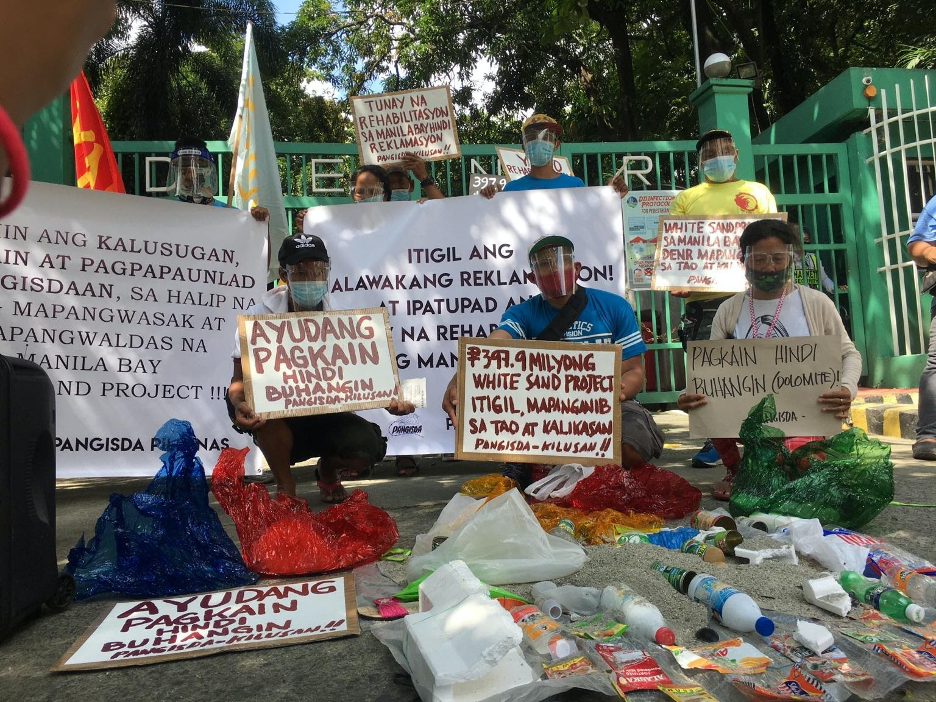
Small-scale fisherfolk from Manila Bay protest outside the Department of Environment and Natural Resources (DENR) against a 398-million-peso government project to transform a strip of shoreline into a white sand (dolomite) beach on September 14, 2020, in Quezon City. Photo: Joseph Purugganan
PANGISDA national president Pablo Rosales spoke at the protest and summarized the group’s opposition to the project. First, they are questioning the priorities of the administration and why it chose to spend this much money on a beautification project over the more urgent needs related to the COVID-19 emergency, especially since the government has been saying that it no longer has enough money to provide support for the health and economic needs.
In their statement, PANGISDA stated: “It is preposterous to make this project a priority amidst the pandemic. The funds used in this project is equivalent to the financial aid of PHP 4,000 (US$82.48) per family for all 100,000 indigent fisherfolk in Manila Bay, most of whom are not able to receive social amelioration, 27,000 laptops or gadgets for online learning, and an estimated 400,000 sets of personal protective equipment for our frontline health workers.”
PANGISDA further asserted: “What the Manila Bay needs is serious rehabilitation – not a wasteful, exorbitant, and pretentious project. It needs to resolve the decades-worth problem of pollution and the sewerage system that flows through Manila Bay from the 17 rivers. The 38 planned reclamations on 26,234 hectares of Manila Bay must be stopped along with 60 other reclamation activities throughout the country under the National Reclamation Plan.”
PANGISDA also spoke out against the possible negative health impacts from the dumping of dolomite minerals. They assailed the Department of Health for making contradictory statements on the possible health risks from inhalation of dolomite dust.
The group also denounced the possible impact on the livelihoods of fisherfolk in general. Prior to this project, the fisherfolk were already campaigning against multi-billion-peso reclamation projects around the bay, which they felt would displace coastal communities and destroy the already degraded fishing grounds. Rosales clarified that the small-scale fishers support the government’s effort to rehabilitate the bay as mandated by a Supreme Court writ of mandamus. However, Rosales said, fishing communities question the development of the bay for commercial interests through reclamation and infrastructure projects and the white sand beach beautification project for tourism at the expense of their livelihoods and the preservation of the bay as a traditional fishing ground.
The fourth issue is the lack of transparency and public consultation. Since Manila Bay is an environmentally critical area as well as a cultural heritage area, small-scale fisherfolk and coastal communities around the bay should have been consulted as part of the process of securing social acceptability.
PANGISDA called for an immediate halt to the project and for the DENR to be held liable for damages caused by the project. They also called for those involved in the project to step down from their position for violating environmental laws, which threatens the health of the citizens, and to put those involved under special audit. The fishing communities vowed to file a petition before the Supreme Court and to continue campaigning t against the project.
Martial law, 48 years later
Led by the In Defense of Human Rights and Dignity Movement (iDEFEND), human rights groups, grassroots activists, and civil society organizations organized a protest action in opposition to the Duterte administration’s current and proposed laws, including the Anti-Terrorism Law, which iDEFEND said reflects some of the most oppressive Martial Law policies of Ferdinand Marcos’s dictatorship. In its statement, the movement said: “Forty-eight years after the ‘conjugal dictatorship’, our people still bear the consequences of the failures of our elite-dominated socio-political and economic system. The change that people were clamoring for has been appropriated by a populist narcissist autocrat who now peddles our land to foreign powers.”
Many students participated in the protest, challenging the notion that the present generation is ignorant or apathetic to the horrors of the Marcos dictatorship. In its September 21 editorial, “Dark Night of Martial Law” the Philippine Daily Inquirer wrote: “Certain young Filipinos also take part in this ritual, having embraced the imperative of learning from history in order to bring about a just and equitable society, indeed the necessity of standing firmly against authoritarianism, whether in its stark form in the Marcos era or in manifestations, nuanced but unmistakable, in the present day.”

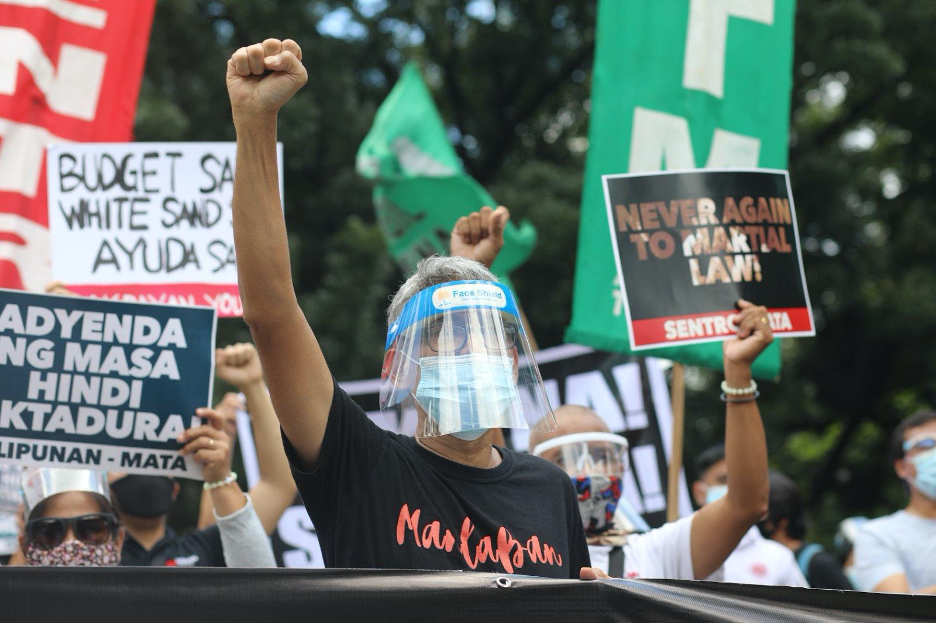
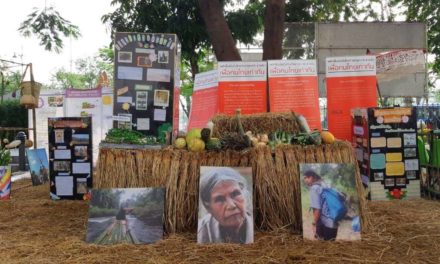
![[Declaration] International Conference for the Abolition of Foreign Military Bases](https://focusweb.org/wp-content/themes/Extra/images/post-format-thumb-text.svg)
